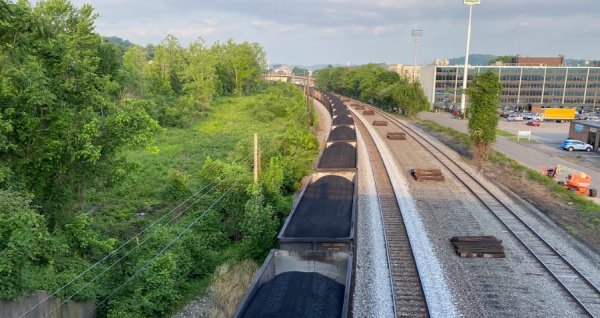On the second day of a hearing about a $297 million power company rate increase request, Public Service Commission Chairwoman Charlotte Lane asked a question that got right at the heart of the matter.

“Should customers have to bear higher rates because ApCo didn’t manage its coal supply adequately?”
On the receiving end was Alex Vaughn, a witness representing Appalachian Power and Wheeling Power. The companies say they have been running behind by millions of dollars on recouping costs while also facing the likelihood of significant additional expenses. Among the reasons are the high costs of fuel supplies and lost opportunities for optimal power production.
“Respectfully chairman, I disagree with how you framed the question,” Vaughn began.
“I figured you would,” responded Lane.
Vaughn went on to say the power companies have done everything possible to stay above water financially in a very challenging economic moment. That included attempts to secure an adequate amount of coal for power plants in a competitive worldwide environment. “And they are what they are, and so yes. My answer would be our customers should pay the cost of service that we use to serve them. I’m going to stop there.”
Appalachian Power and Wheeling Power are asking utilities regulators for the $297 million annual rate adjustment because costs have outpaced revenue at the Amos, Mountaineer and Mitchell plants in West Virginia.
Customers could take the hit.
Currently the monthly bill for a residential customer using 1,000 kilowatt-hours is $155.66, according to Appalachian Power. If approved as filed the adjustment would add $18.41 to that amount.
The power companies’ big financial challenges occurred as demand ramped up first for natural gas supplies and then for coal. Company representatives took the stand over the past couple of days to say some suppliers were slow to meet their obligations or just plain didn’t come through.
When the companies then sought alternatives, competition for coal supplies was so stiff that costs were sky high — or there were no alternative supplies to be found.
Lane and the other commissioners asked a series of questions about why the companies weren’t keeping more significant coal supplies on hand to begin with. Representatives of the Public Service Commission’s Consumer Advocate Division and the West Virginia Energy Users Group also asked why the companies weren’t better prepared for high demand for fuel supplies.
Jeffrey Dial, director of coal, transportation and reagent procurement, testified that the power companies have made concerted efforts to secure additional coal supplies while also bringing on new mine production. “Yes, I believe we’re taking appropriate steps,” he said.
But, he said, “the coal market’s constrained. I think everybody in this room would agree with that.” He continued, “You can have contingency plans but again if the supply is not out there, it doesn’t matter.”

Commissioners asked more, similar questions of one of Appalachian Power’s top executives, John Scalzo, vice president, regulatory and finance. Scalzo described himself as pounding the pavement to try to secure coal supplies. “That coal doesn’t exist. It’s not like we’re not trying run or trying to get it. It’s just not there.”
He said the coal industry has been contracting for years, diminishing supplies. “If we had more coal, we would have run the units more. There’s no doubt in my mind,” Scalzo said.
He made those comments to Commissioner Bill Raney, the retired director of the West Virginia Coal Association. When they concluded their exchange, Scalzo quipped, “You got any coal?”
Lane followed up by asking him, “Is there anybody that would have thought that if you’ve got coal-fired power plants that you need adequate coal supply on the ground? And is it possible that this problem started several years ago when you weren’t contracting for as much coal and that’s why the coal industry has contracted?”
Scalzo doubted that supposition, saying the power company tries to anticipate the coal it will need based on market demands. Sometimes that works out and sometimes the unexpected happens. “No one saw this coming,” he said.
Lane interjected, “But shouldn’t you have seen it coming?”
“Well, how?” Scalzo asked. “The year before, I had coal piling up around our ears and a hundred-plus days of coal.”
“Well, why didn’t you keep it at that level?” Lane asked.
Scalzo said having that amount on hand isn’t realistic economically or in terms of the actual available space, particularly if even more coal under contract is being shipped in. Lane shot back, “Better than $400 million under recovery.”
Near the end of the day, Lane posed a broad question to Ralph Smith, a witness for the Consumer Advocate Division who has been critical of the power company handling of coal supplies. “When you were hired to look at this case and look at the facts, what was your gut reaction?” Lane asked.
Smith described the first call he got to take a look at the case, including a description that three West Virginia coal-fired plants lacked enough coal for optimal performance.
“I was just — how can this possibly be the case? This is West Virginia. West Virginia has been a strong supporter of coal, of using coal generation, of having utilities keep their coal plants running. I was just, like, aghast. How can this possibly happen? I just couldn’t believe it.”
Then, as Smith reviewed the information in the case, he concluded each of the three plants had run way below capacity because of the fuel supply issues. If they’d had coal to burn, he said, they could have been selling more power at higher rates.
“These plants could have been deeply in the money for numerous hours when they had to curtail the operation because they didn’t have adequate coal,” he said. “I’m still trying to get my head around how these West Virginia plants could have had an inadequate coal inventory. I’m just shocked by it.”
“Thank you, Mr. Smith,” Lane said. “That was a good answer.”


